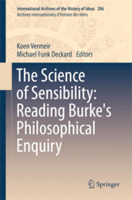
Koen Vermeir et Michael Funk Deckard, (Eds.)
Attracting philosophers, politicians, artists as well as the educated reader, Edmund Burke’s Philosophical Enquiry into the Origin of Our Ideas of the Sublime and Beautiful, first published in 1757, was a milestone in western thinking. Situated on the threshold between early modern philosophy and the Enlightenment, Burke’s oeuvre combines reflections on aesthetics, politics and the sciences. In the eighteenth century, these domains were connected by the key notion of sensibility, which structured debates not only in physiology, epistemology and psychology, but also in the arts and in politics. This notion referred to an organic sensitivity depending on the nervous structure of the human body. At the same time, however, sensibility denoted subtle moral and aesthetic perceptions, an acuteness of emotional and physical feeling and the susceptibility to delicate or powerful passionate arousal. The Science of Sensibility interprets Burke’s Philosophical Enquiry as an important contribution to this culture of sensibility and places this seminal work in its broader historical and philosophical context.
Authors in this collection come from various disciplines and give a manifold of perspectives on Burke’s Philosophical Enquiry, including approaches from art history, classics, English literature, cultural history, history of science, philosophy, political science, Irish studies, cultural studies and feminist studies. Confronting established fields with new disciplines and sub-disciplines, this edited volume reassesses Burke’s prominence in the history of ideas. The Science of Sensibility is the first book length work devoted primarily to Burke’s Philosophical Enquiry in both its historical context and for its contemporary relevance
: : Springer, International Archives of the History of Ideas n°206
: : 338 p.
: : ISBN 978-94-007-2102-9
: : 2012
Table des matières
Preface : Edmund Burke’s Philosophical Enquiry in context, M.F. Deckard, K. Vermeir
Part 1 : SCIENCE AND SENSIBILITY
- Philosophical Enquiries into the Science of Sensibility : An Introductory Essay, p. 3
Koen Vermeir, Michael Funk Deckard - ’Communicating a Sort of Philosophical Solidity to Taste’ : Newtonian Elements in Burke’s Methodology in Philosophical Enquiry, p. 57
Steffen Ducheyne - Hyporborean Meteorologies of Culture : Art’s Progress and Medical Environmentalism in Arbuthnot, Burke and Barr, p. 69
Aris Sarafianos - From the Enquiry (1757) to the Fourth Kritisches Wäldchen (1769) : Burke and Herder on the Division of the Senses p. 91
Herman Parret, - Edmund Burke and John Locke on the Metaphysics of Substance, p. 107
Joseph Pappin III
Part 2 : SENSIBILITY IN POLITICS, SOCIABILITY AND MORALS
- The Politics of Burke’s Enquiry, p. 125
F.P. Lock - Aisling Gheár – A Terrible Beauty : The Gaelic Background to Burke’s Enquiry, p. 139
Katherine O’Donnell - Pity and Fear : Providential Sociability in Burke’s Philosophical Enquiry, p. 151
Richard Bourke - Burke and Kant on the Social Nature of Aesthetic Experience, p. 177
Bart Vandenabeele - The Sublime, the Beautiful, and the Political in Burke’s Work, p. 193
Daniel I. O’Neill
Part 3 : AESTHETICS AND THE SCIENCE OF SENSIBILITY
- Burke’s Classical Heritage : Playing Games with Longinus, p. 225
Cressida Ryan - Edmund Burke among the Poets : Milton, Lucretius and the Philosophical Enquiry, p. 247
Paddy Bullard - ‘Expressive Uncertainty’ : Edmund Burke’s Theory of the Sublime and Eighteenth-Century Conceptions of Metaphor, p. 265
Frans De Bruyn - Between Knowledge and Sentiment : Burke and Hume on Taste, p. 283
Dario Perinetti - Burke, the Revenge of Obscurity and the Foundation of the Aesthetic, p. 305
Baldine Saint Girons
Index, p. 327



